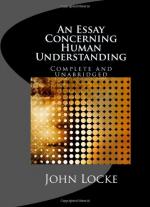|
This section contains 8,631 words (approx. 29 pages at 300 words per page) |

|
SOURCE: "The Way of Hypotheses: Locke on Method," in Journal of the History of Ideas, Vol. XL VIII, No. 1, January-March, 1987, pp. 51-72.
In the following essay, Farr examines two opposing interpretations of Locke's understanding of the functions of scientific hypotheses and proposes an alternative reading of Locke's philosophy in an attempt to reconcile these two positions.
"[A]s every ones hypothesis is, soe is his reason disposed to judge …"1
The specter of empiricism no longer haunts the Essay Concerning Human Understanding as once it did. Thanks to historically-minded philosophers and philosophically-minded historians, the interpretation of John Locke's masterwork is at long last being spared the time-honored ritual of reading back into it the concerns of later contrivance. The spell cast by Berkeley and Hume and Russell has largely been broken. The alleged empiricist philosopher of common sense has had restored to him an epistemology devoted to vindicating its...
|
This section contains 8,631 words (approx. 29 pages at 300 words per page) |

|


